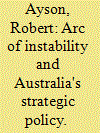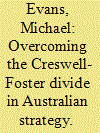| Srl | Item |
| 1 |
ID:
077240


|
|
|
|
|
| Publication |
2007.
|
| Summary/Abstract |
The proposition that Australia faces an 'arc of instability' to its north has been an important feature of the Australian strategic debate in the early twenty-first century. Prompted by worries in the late 1990s over Indonesia's future and East Timor's uncertain path to independence, the 'arc' metaphor also encapsulated growing Australian concerns about the political cohesiveness of Melanesian polities, including Papua New Guinea and Solomon Islands. While tending to overlook the divergent experiences of countries within its expanding boundaries, the 'arc' fed from Australia's historical requirement for a secure archipelagic screen. As such it has became an important weapon in the debate over whether the locus of Australia's strategic priorities should be increasingly global in the 'war on terror' period or remain closer to home in the immediate region. The 'arc of instability' metaphor was consequently adopted by leading Australian Labor Party politicians to argue that the Howard Coalition government was neglecting South Pacific security challenges. It became less prominent following the Howard government's greater activism in the South Pacific, signalled by Australia's leadership of the East Timor intervention in 2003. But its prominence returned in 2006 with the unrest in both Honiara and Dili. In overall terms, the 'arc of instability' discussion has helped direct Australian strategic and political attention to the immediate neighbourhood. But it has not provided specific policy guidance on what should be done to address the instabilities it includes.
|
|
|
|
|
|
|
|
|
|
|
|
|
|
|
|
| 2 |
ID:
077236


|
|
|
|
|
| Publication |
2007.
|
| Summary/Abstract |
The Bush administration has manoeuvred itself into an exquisite dilemma. Iraq is by all reasonable assessments a foreign policy calamity and perceptions of American power and legitimacy are at an all time low. All the options available to the US in dealing with the situation carry significant costs. For the US to extricate itself from Iraq it must engage with regimes that it claims it has an existential and intractable conflict with, such as Iran and Syria. This is a direct outcome of the failure of the Bush administration to acknowledge the realities of the situation in Iraq and the complexities involved in solving this crisis. It also highlights a much greater problem with current US foreign policy towards the Middle East, namely an ignorance of the interconnected nature of conflicts and tensions in the region. Approaching Iran and Syria regarding the Iraqi crisis would signal a positive shift away from the current values-driven unilateralism towards a more realistic and flexible policy to further US national interests.
|
|
|
|
|
|
|
|
|
|
|
|
|
|
|
|
| 3 |
ID:
077237


|
|
|
|
|
| Publication |
2007.
|
| Summary/Abstract |
What have been the consequences of the Maoists' decade-long campaign in Nepal? The rebellion that emerged in 1996 can be understood as symptomatic of the nation's struggle for democracy with its origins in the nation's social and economic inequalities, and in the failure of parliamentary democracy in Nepal. However the conflict has important regional and international dimensions. The conflict has been disconcerting for China and India, particularly given the increased U.S. involvement in Nepali affairs in the current context of the war on terror. Had the war occured half a century earlier in the era of Third World independence movements, it may have been viewed differently.
|
|
|
|
|
|
|
|
|
|
|
|
|
|
|
|
| 4 |
ID:
077239


|
|
|
|
|
| Publication |
2007.
|
| Summary/Abstract |
This article examines the continuing influence of the contending twentieth century schools of Creswellian continental defence and Fosterite expeditionary defence in Australian strategy. A context for analysis is developed through an examination of the contemporary globalised security environment which is marked by bifurcation into state-centric and multi-centric threats. The demands of this new security environment have led to the evolution of twenty-first century manifestations of the Creswell-Foster divide in the form of the defender-regionalist and the reformer-globalist schools of strategy. The article analyses how differences between these two schools, especially over the value of geography, have been exacerbated by the new dynamics of globalised security. In the future, however, overcoming the contemporary Creswell-Foster divide between the defender-regionalists and the reformer-globalists in Australian strategy is unlikely to occur in the exclusive arena of defence policy. Rather, what is required is the creation of an overarching national security strategy beginning with the establishment of an Australian Commission on Twenty-First Century National Security. Such a Commission could be modelled on the US Hart-Rudman Commission of 1999-2001 and be suitably adapted to Australian conditions. An Australian commission should be charged with producing a long-term report on holistic and 'best practice' security policy options for upholding and protecting Australia's vital national interests in the first quarter of the twenty-first century.
|
|
|
|
|
|
|
|
|
|
|
|
|
|
|
|
| 5 |
ID:
077238


|
|
|
|
|
| Publication |
2007.
|
| Summary/Abstract |
This article argues that the perceptual shock of 11 September transformed the mental picture which shapes the Australian government's approach to national security. The expansive and transformationalist range of strategic concepts introduced post-11 September by key government ministers and the prime minister in their public commentary, and formally expressed in a variety of post-11 September policy releases, have been substantial enough to conclude that the central geostrategic narrative underpinning Australia's pre-11 September strategic posture has been diluted sufficiently to render it 'one of many' shapers of Australia's post-11 September strategic orientation. It is this article's finding that the perceptual shock of 11 September has been sufficiently consequential to produce a paradigm shift in Australian strategy
|
|
|
|
|
|
|
|
|
|
|
|
|
|
|
|
| 6 |
ID:
077241


|
|
|
|
|
| Publication |
2007.
|
| Summary/Abstract |
Dominant discourses and strategies of the post-11 September 'war on terror' reflect an ideological absolutism that has left the democratic space of civil society in the Asia-Pacific severely curtailed and compressed. Recovery of this distinct space of freedom, so crucial to 'civilisational' amity, begins with the strategic deconstruction of the totalising logics and practices underwriting not only the words and deeds of religious militants but also those of state actors. Accordingly, amity is best sought not through uncritical fidelity to essentialist and exclusivist understandings of subjectivity, but acknowledgement and acceptance of the reality that the self is necessarily indebted to the other, to which the former must exercise an ethical responsibility.
|
|
|
|
|
|
|
|
|
|
|
|
|
|
|
|
| 7 |
ID:
077242


|
|
|
|
|
| Publication |
2007.
|
| Summary/Abstract |
Recognising that America's response to the events of 11 September would do well to maintain a sharp distinction between the 'war on terror' and a war 'against Islam', this article argues that American diplomatic rhetoric would benefit from an explicit effort to engage 'frameworks of legitimacy' within Islam, including the terms of Islamic jurisprudence and Islamic legal debate. The article examines the merits of such an approach in the context of several recent diplomatic dilemmas, including the Jyllens-Posten cartoon controversy. It concludes with an assessment of the American (domestic) political environment within which this approach tends to encounter its most ardent critics.
|
|
|
|
|
|
|
|
|
|
|
|
|
|
|
|
| 8 |
ID:
077243


|
|
|
|
|
| Publication |
2007.
|
| Summary/Abstract |
The World Food Programme (WFP) is currently the largest and arguably one of the most successful of the United Nations Special Agencies, yet there has been little examination of it by international relations scholars since the early 1990s. This article seeks to analyse the normative and political characteristics of the WFP which have contributed to its effectiveness. Among its most significant findings is that American agricultural interests, interpreted through the prism of domestic political norms, have dovetailed with 'feed-the-hungry' norms that are projected and implemented by the WFP, resulting in the strong support of the United States for the WFP. This support undermines the perception, promoted by some critics, that the UN is incapable of acting in ways that are compatible with the national interests of the United States and other significant member-states who inherently pursue 'national interests' in institutional environments.
|
|
|
|
|
|
|
|
|
|
|
|
|
|
|
|